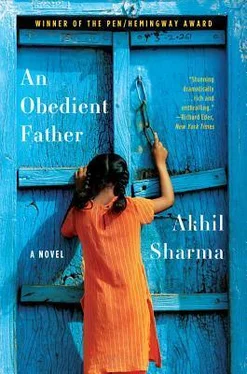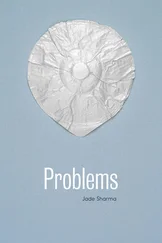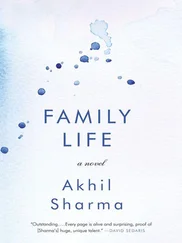I reached up to touch my lips and Anita grabbed my hand. She must have thought I was going to slap her. She saw from my shock that this was wrong and, laughing sarcastically, said, "After eating a thousand mice, the cat goes on a haj."
Asha must have seen her mother's anger, because she started to cry. Anita noticed it first, and then, through her reaction, I did. Asha's face was completely wet. As soon as Anita saw Asha crying, she went to her and held her from behind. Asha tried pulling out of her embrace. Her sobs sounded like suppressed coughs. "What are you crying for?" Anita asked.
"You. I'm crying because of you."
"What have I done to you?"
"I'm crying because I'm going to die and I'll never have been happy. Sometimes I wake in the middle of the night and I think if I die before morning then nothing good will ever have happened to me." Saying this, Asha wailed and broke from Anita's grip. She ran two steps, then turned around to confront her mother.
"You're not going to die," Anita said. "You're going to live eighty more years."
"You're going to die, too," Asha sobbed.
"I'm not afraid."
Anita hugged Asha again, but she kept crying. After a while Anita began murmuring to her, "What do you want?" This set Asha shrieking.
A boy about Asha's age with a kite came out onto a long roof across the courtyard from us. He put the kite on the ground, jiggled it with the thread in his hand, and then jerked hard. As the kite was flung up, he let the thread flow through his fingers. He gave short,
sharp tugs and with each almost immediately released more thread. The kite caught a breeze. I saw Asha focusing on the boy without stopping her crying. After several minutes, when the kite was high and steady, Asha became quiet, though occasional tears leaked from her eyes.
"Why did you cry?" Anita asked.
"We never do anything. We never go anywhere."
"What do you want to do?"
"I want something sweet with dinner."
"All right."
At this Asha gasped and began sobbing again.
"We can do anything you want," I said. Anita did not look at me, and pulled Asha tighter to her.
"I want an adventure," Asha said, looking up at her mother.
Beyond them were roof after roof, like steps which went up for a little while and then dropped. "We could walk across Delhi from roof to roof," I said. "I heard of one man who did that. He used ropes and ladders." I had no idea where the idea came from, but as soon as I said it, the idea's miraculous freedom captured me. Asha's face was startled into calm. I thought of climbing from our balcony to the squatters' roofs and crossing those to a building which faced the approach to the Old Clock Tower. From there, with the help of ladders placed across the narrow alleyways, we could literally walk across roofs to the Old Clock Tower. "We could see how far we can go."
"That's an adventure," Asha said, glancing at me.
"It isn't that dangerous," I said and, of course, realized that it was.
Anita sighed and kissed Asha's cheeks. The sigh was enough to end our fantasies. Asha stared at the boy with the kite. Anita looked at me, but I could not tell what she was thinking.
"There are other things," I said.
"Tomorrow we'll do something," Anita said into Asha's ear. Her voice was thoughtful.
"Let's go out tonight," I offered.
"Yes," Asha said.
After a moment's hesitation Anita said, "All right."
"Let's go to a movie," I suggested.
"Yes. Yes," Asha said, staring up at her mother.
Anita looked at me and then at Asha. "Yes," she repeated.
SEVEN
I
started to buy things for Asha. Most nights I purchased a half Hter of milk and two Campa Colas and stirred them together with many spoonfuls of sugar. All three of us had contests of eating raisins and almonds. Asha was so thin that when she flexed her hands there was the eeriness of watching individual bones working. Sometimes I brought home coloring books and gave them to Anita to present to Asha. When I discovered that Asha liked stickers, I bought long rolls of them and had Anita hide them in Asha's pocket.
Kindness made me feel competent. When the electricity generators didn't appear at one of Mr. Gupta's rallies, I could imagine feeding Asha canned lychees and this somehow made me less unhappy with the moment. The van driver who blasted Mr. Gupta's slogans from loudspeakers crashed into an autorickshaw. I laughed as I told
Asha this, whereas earlier that day I had felt fear at the inept campaign we were waging.
The first time I met Asha at Rosary School, it was because I was passing near it and thought she might feel protected seeing my familiarity with Father Joseph. Father Joseph sent one peon for Asha and another for Campa Cola.
"Asha is a serious girl. Was she so serious before her father died?" he asked as we waited. I was on the sofa where I had sat and spat onto the carpet when I was extorting money from him. Remembering that made me feel I had power over Father Joseph. I slouched back at ease. Father Joseph was seated on a chair across from me with his legs crossed.
"She was always quiet, I think."
I was surprised that he would know her enough to have an opinion.
"She shouldn't bring her problems to school," he said.
Asha came in as I tried to interpret his words. She wore a blue shirt and a maroon skirt. Her maroon jacket was buttoned over a maroon sweater. When she saw me, her face sagged. She pressed the fingers of both hands over her mouth and keened.
"What happened?" Father Joseph asked.
The slight guilt I felt at being there without Anita's knowledge made me feel as if I had caused the tears. I went and knelt beside Asha. "Everything is all right," I said. She did not remove her hands. I put my arms around her. Asha cried more loudly. Father Joseph stood near us with his arms folded across his chest. "My little mango, you'll get salty crying."
"Mummy is all right?" Asha asked, gasping.
"Yes."
She surged around my neck. I lifted her up. "Mummy came to the school to tell me Daddy died." Asha continued crying and I continued holding her. It took ten or fifteen minutes before she calmed down.
"Have a cold drink," Father Joseph kept muttering. Asha drank the Campa and went back to her classes.
"She cries often in class," he said. "We send her to walk around the grounds. Sometimes she spends the whole day outside. The teacher goes out during recess and finds Asha asleep on the ground. As soon as she wakes, she starts crying again." Father Joseph said this with exasperation. "She has to leave her sadness at home."
I looked at him. He looked back into my eyes. This is his revenge, I thought. The room vanished and all I could see was his round face. Without realizing it, I had moved close to him. Father Joseph tilted back. He had a series of tiny white bubbles growing to the side of one nostril. "Asha's very sensitive," I whispered.
"Yes," he said, and speaking released some fear onto his face.
"Please take care of her."
I took Asha to a restaurant across the road and we ate ice cream. She said almost nothing, except when we were returning to school. "Don't tell Mummy," she asked.
"Why?"
"She'll be aiigry"
For a moment I wondered if Asha meant that Anita would be angry at me for coming. Then I understood she probably thought Anita would be angry at her. "Why would your mummy be angry?"
Asha only looked ahead at the road we were crossing.
Perhaps we inherit the way we respond to grief the way we inherit height or skin color. The form of Asha's sorrows was so similar to how I had responded to my mother's death that almost instantly I loved her.
When I was young, the first sign of love was fear, the fear of appearing ridiculous or incompetent to some friend I had loved for a week or to the first prostitute or to Radha. The first sign of loving Asha was joy Instead of climbing onto a bus, I jumped on. The joy explained everything. The dirt field outside my office window existed as something Asha might perhaps see or whose dust might inspire some sentence in a conversation we had. I never believed I could harm her.
Читать дальше












